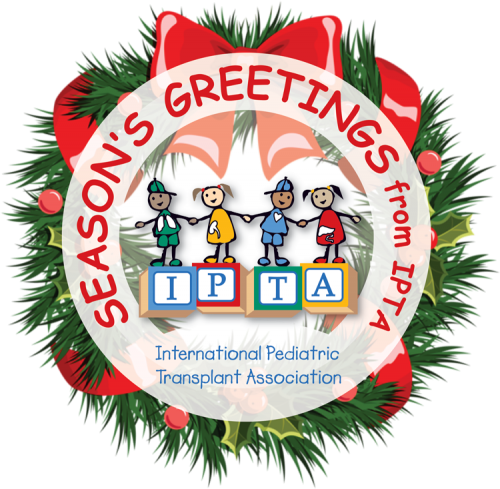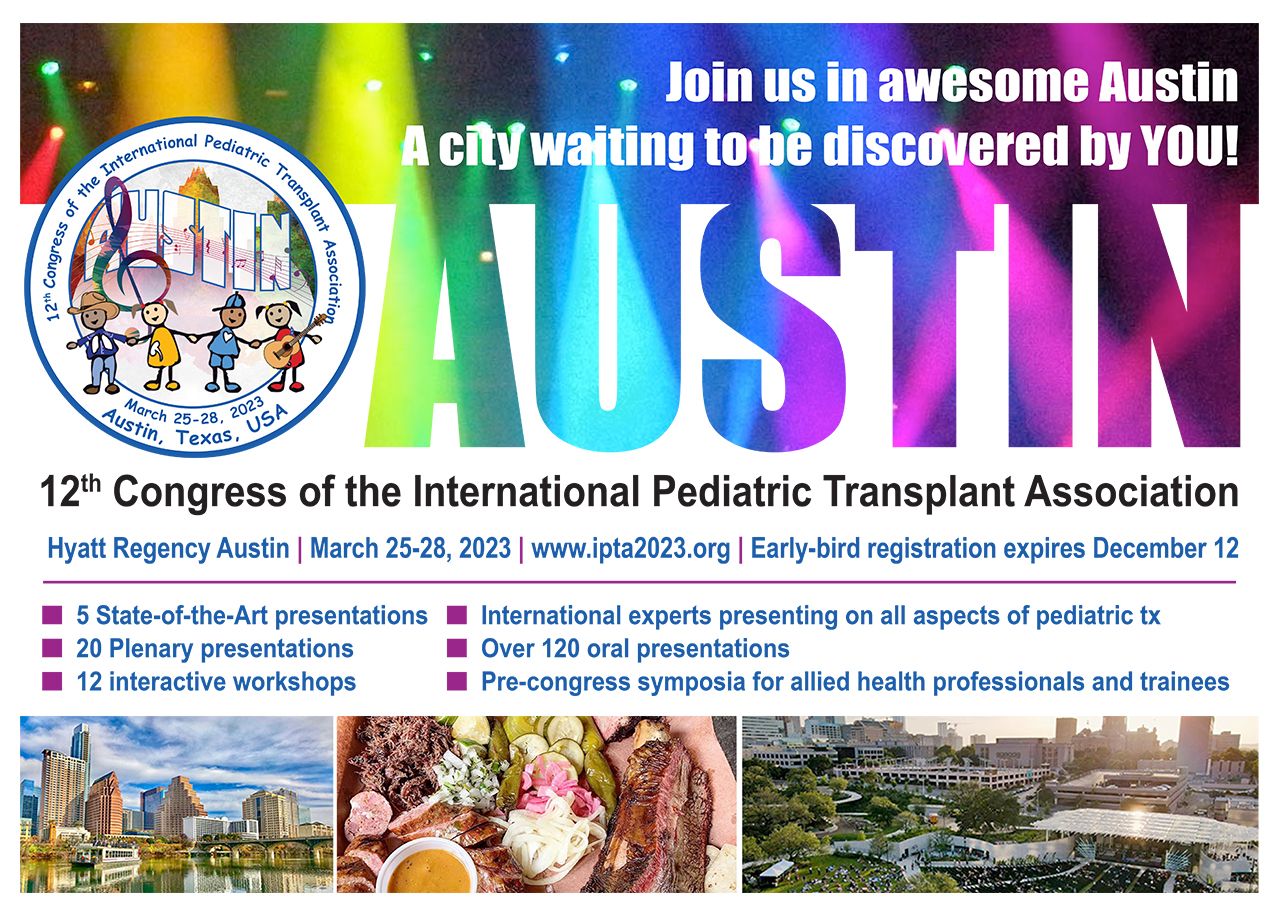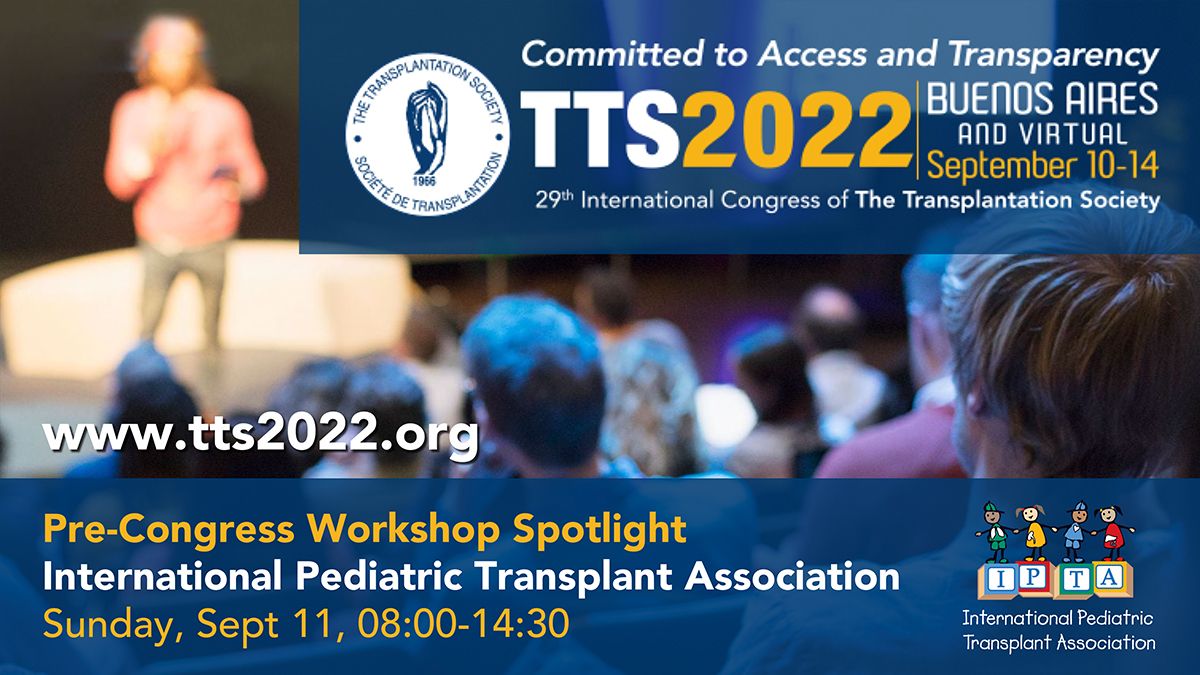


The Holiday season is upon us once again! Doesn’t it feel as if time just flies, and once again, we are back to celebrating with family and friends, and looking forward to what the upcoming year has to offer? As the first snows start to fall in the Northern Hemisphere, I know that’s how it feels for me anyway!
I am so excited to invite you all to the 12th Congress of the International Pediatric Transplant Association. The meeting will be held in the eclectic city of Austin, Texas on March 25-28, 2023. If you have yet to visit Austin, www.austintexas.org there’s no better excuse to come and discover this unique city than to join us and share new learnings in the field of pediatric transplantation. With an exciting Program, c.60 invited speakers, c. 180 abstract presenters and c. 45 sessions overall, the Congress is certain to be at the forefront of pediatric transplantation education. Please go to www.ipta2023.org/registration-hotel/registration-details to register. Early Bird registration ends on December 12th, so don’t delay on taking advantage of this Holiday treat! We look forward to seeing you there!
As we look forward to meeting up in person once again at our IPTA Congress year in 2023, let’s take a look back over what IPTA has achieved in 2022!
Here are some of the highlights:
- IPTA 2022 Congress - our Virtual Congress was a huge success! The virtual format also allowed for IPTA members from all over the globe to easily participate. With a combined registration and membership package offered, we were able to grow membership exponentially, welcoming new members to IPTA from places such as Botswana, Bolivia, and Georgia. Recordings are available to IPTA members and can be viewed here:
- IPTA Pre-Congress workshop at TTS 2022 Congress in Buenos Aires, Argentina. IPTA was proud to represent children requiring transplantation at TTS 2022. We hosted 4 x well-attended sessions, with 11 speakers overall. Recordings are available to IPTA members and can be viewed here:
- 4 x webinars, including one on vaccine hesitancy which was a collaboration between the Ethics Committee and the ID Committee, plus our collaboration with SPLIT on a series of Allied Health webinars:
- 5 x new webinars, adding to our library of digital content, the IPTA SMARTER Initiative (spearheaded by the Education Committee):
- IPTA 2022 Outreach Committee Program yielded 2 successful partnerships between Colombia and Canada and Ukraine and Belgium. Watch this space for more news as these Programs grow!
- 241 manuscripts published in Pediatric Transplantation
- Our IPTA ListServ was launched!
- Creation of 2 new Committees: Membership Communications and Multi-Organ.
Our IPTA Council colleague Luca dello Strologo sadly passed away this year after a long illness. We will remember him and his dedication to pediatric transplant patients always.
On a personal note, I was honored to be highlighted by my center, Stanford, acknowledging and celebrating 35 years of service to children requiring transplantation recently. You can read more about this here:
My IPTA colleague and presidential predecessor Mignon McCulloch has also just been voted South African Transplant Society President – a position not often held by a physician, a pediatrician or a female. Congratulations Mignon, and thank you for advocating for children requiring transplantation worldwide!
To all of our IPTA members, staff and volunteers, and to all pediatric transplant patients and families worldwide, I wish you a Happy Holiday Season, and all the best for 2023. See you in Austin!
Yours respectfully,
Carlos O. Esquivel
IPTA President
Past Issues
IPTA Newsletters
- IPTA Newsletter - October 2025
- IPTA Newsletter - June 2025
- IPTA Newsletter - March 2025
- IPTA Newsletter - December 2024
- IPTA Newsletter - October 2024
- IPTA Newsletter - May 2024
- IPTA Newsletter - February 2024
- IPTA Newsletter - November 2023
- IPTA Newsletter - September 2023
- IPTA Newsletter - May 2023
- IPTA Newsletter - March 2023
- IPTA Newsletter - December 2022
- IPTA Newsletter - October 2022
- IPTA Newsletter - July 2022
- IPTA Newsletter - May 2022
- IPTA Newsletter - December 2021
- IPTA Newsletter - October 2021
- IPTA Newsletter - June 2021
- IPTA Newsletter - October 2020
- IPTA Newsletter - June 2020
- IPTA Newsletter - March 2020
- IPTA Newsletter - December 2019
- IPTA Newsletter - September 2019
- IPTA Newsletter - July 2019
- IPTA Newsletter - April 2019
- IPTA Newsletter - December 2018
- IPTA Newsletter - September 2018
- IPTA Newsletter - June 2018
- IPTA Newsletter - March 2018
- IPTA Newsletter - December 2017
- IPTA Newsletter - September 2017
- IPTA Newsletter - December 2016
- IPTA Newsletter - September 2016
Contact
Address
International Pediatric Transplant Association
c/o The Transplantation Society
740 Notre-Dame Ouest
Suite 1245
Montréal, QC, H3C 3X6
Canada












